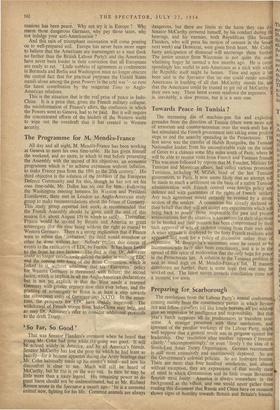Towards Peace in Tunisia ?
The increasing din of machine-gun fire and explod in grenades from the direction of Tunisia (there were more aL. of terrorism and counter-terrorism over the week-end) has a last stimulated the French government into taking some positiv steps to end the anarchy spreading in the Protectorate. Th first move was the transfer of Habib Bourguiba, the Tunisia Nationalist leader, from his uncomfortal)le exile on the islan of Groix to a château some fifty miles south of Paris, where h will be able to receive visits from French and Tunisian friend This was soon followed by reports that M. Fouchet, Minister fo Tunisian and Moroccan affairs, had called various prominent Tunisians, including M. M'Zali, head of the last Tunisian government, to Paris. It now seems likely that an attempt will be made to reach a settlement on the basis of a native Tunisian administration with French control over foreign policy and defence and with guarantees of the rights of French settlers, Any such agreement would certainly be resisted by a strong' section of the settlers. A committee has already declared on their behalf that they will not accept any experiments which will bring back to power those responsible for past and present assassinations, but the situation is too serious for their objections to be heeded and their position has been compromised by their tacit approval of acts of violence coming from their own side. A wiser attitude is displayed by the forty French residents who appealed last week for a policy of discussion rather than of repression. M. Bourguiba's statements since he ceased to be incommunicado have also been conciliatory„ and it is in the' spread of this spirit of moderation that the only hope for peace in the Protectorate lies. A solution to the Tunisian problem is said to stand high on M. Mendes-France's list. If matters deteriorate no further, there is some hope that one may be worked out. The latest moves towards conciliation conic no a moment too soon.


































 Previous page
Previous page